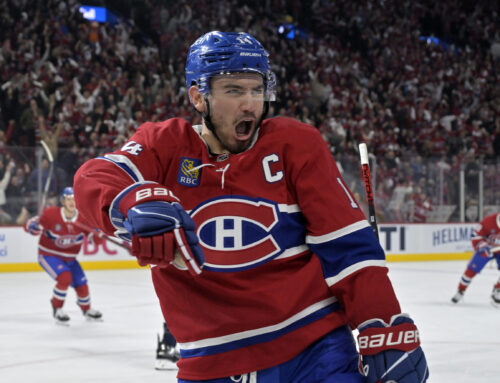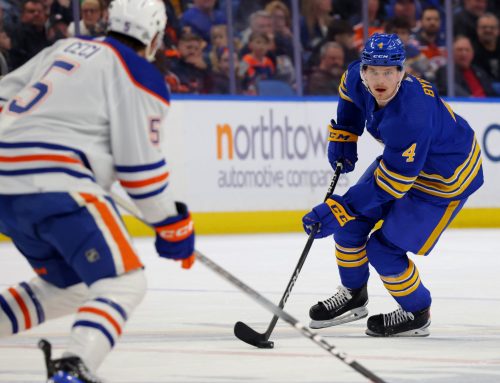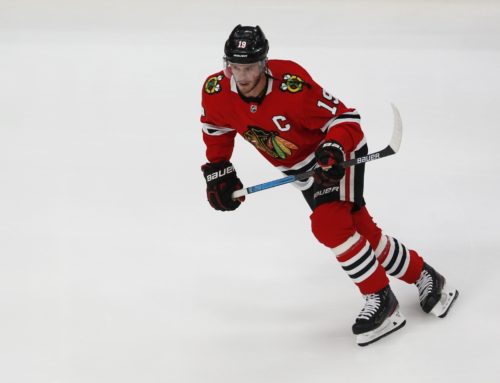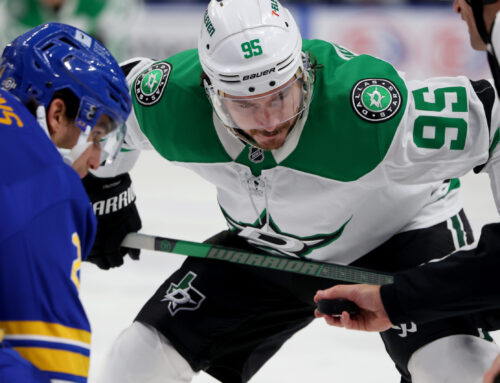
Las Vegas Expansion, the NHL and Fantasy Awards, and Real-Time Stats in Fantasy
****
The big news of the day was the official announcement of the expansion franchise in Las Vegas, to begin the 2017-2018 season. Rather than going over those details, here are the ins-and-outs of the expansion, and my thoughts on the matter from three weeks ago.
****
Keith Yandle signed a seven-year deal with the Florida Panthers late last night (well, early this morning). I will have a longer piece covering the fantasy angle of Yandle in a Panther uniform, but for now, this is what I had to say about it when he had his rights initially traded.
****
I had a conversation last night with a few writers from the fantasy hockey realm including, but not exclusive to, Steve Laidlaw from here at Dobber. The topic was the use of certain stats in fantasy scoring, notably plus/minus, hits, blocked shots, and penalty minutes.
As far as plus/minus goes, as some sort of predictive/descriptive statistic, it’s about as useful as a player’s hair colour. What I will say is that at the very least, it tends to reward players on good teams (and sometimes players on mediocre/bad teams with great goaltending): there were 16 players that were plus-22 or better last year, and they were all from playoff teams. There was also just one player in the top-30 from a non-playoff team (Brad Marchand). While plus/minus doesn’t really tell us a lot about the player – the top-3 defencemen in plus/minus were Brian Campbell, Colton Parayko, and Olli Maatta; all good d-men, none are among the truly elite – at least it rewards players from a good team. Replacing it with something like CorsiForPercentage Relative would be infinitely better, but I digress.
Penalty minutes are generally bad for a team. That is why it is kind of curious that it’s included – other than fighting majors or misconducts, players taking penalties are putting their teams at a disadvantage. It’s like rewarding quarterbacks for interceptions in fantasy football. Replacing it with penalties drawn, or penalties drawn less penalties taken, would be a drastic improvement.
My main gripe, though, is with hits and blocked shots. As far as the latter goes, this is one of the best analogies imaginable for the problem with blocked shots:
Blocking shots is like killing rats. Doing it is preferable to not, but if you’re doing it all the time it suggests you have bigger problems
— Kent Wilson (@Kent_Wilson) March 18, 2015
The five teams last year that blocked the most shots in the regular season were, from most to least, Colorado, the Islanders, Calgary, the Rangers, and the Flyers. Does any of those teams strike anyone as a real quality squad from last year? Again, it’s rewarding players that play for poor (or lucky) teams by engaging in a practice that indicates a team getting pummeled by their opponent. Again, for a fantasy football analogy, it’s like rewarding team defences for giving up a lot of yards.
As for hits, the big issue is what qualifies as a hit? There is no real, widely accepted definition for what is a hit in hockey. What is a run, an RBI, an interception, a sack, a three-pointer, a rebound? Those are all clearly defined. What exactly is a hit is not.
An unclearly defined “hit” is just part of the problem of unreliable data as well. I recommend readers go through this blog post from TSN writer Travis Yost. The NHL’s collection of data in everything from shot attempts, to zone starts, to shot location, is laughable. They are so incredibly unreliable that I hesitate to rely on them for even the most basic statistics.
So the problem with hits and blocked shots is three-fold:
- Tends to reward poor team play, or poor individual play.
- They are not clearly defined (specifically hits).
- The data collection is unreliable.
There is no real good reason to include these stats in fantasy leagues, other than to expand the useful player pool. The spirit of fantasy sports is to compile the best team using the best players. Using real-time stats to add categories and expand the player pool makes it convoluting at best, and goes against the very reason many of us got interested in fantasy sports in the first place.
****
Aside from the Las Vegas expansion, the big happening yesterday in the NHL was the NHL awards. I thought it’d be a good exercise to go through the “Big Five” awards from a fantasy angle, as well as touching on the actual award presented. Please don’t yell at me too much.
The Fantasy MVP – Artemi Panarin
It’s important to note here that it’s the most valuable player. In fantasy, the most valuable player, in my mind, is the player that was a minimal cost on draft day, but returned immense value to the owner that selected him. Two names immediately came to mind, so I went with the player that was chosen later in drafts: Artemi Panarin.
The 24-year-old rookie had an absolute monster campaign, averaging nearly a point-per-game (77 in 80), with 24 power play points mixed in there. He had the highest point-per-game average of any rookie since Evgeni Malkin, and had 30 goals to boot. Throw in a handful of penalty minutes, and over two shots a game, and he was likely a top-20 forward in most formats.
No, Panarin didn’t provide the most value on par with names like Ovechkin or Benn, but considering where he was drafted, he was a game-changer for his fantasy owners.
Honourable Mentions:
The Real MVP – Patrick Kane
With his point pace this year, there was no doubt where this award was going to go. Shoutout to the writer who had Ryan Kesler fourth in Hart voting:
Hart voting pic.twitter.com/HRvM1ewwYL
— Travis Hughes (@TravisSBN) June 23, 2016
The Fantasy Norris – Brent Burns
An argument could be made for Karlsson, but in a roto format, Brent Burns was an absolute monster. Not only did he manage 75 points (including 27 goals and 30 power play points), but he was the first defenceman in 20 years with at least 350 shots on goal. That is a massive number, and to go with decent penalty minute totals, it’s why he gets the fantasy Norris Trophy from me.
Most fantasy owners likely expected a good season from Burns. He was coming off a 60-point season where he averaged nearly three shots a game. To jump to 75 points and over four shots a game, though, was likely out of the realm of what most thought he would perform. Every player always has that one magical season where everything clicks production-wise, and this was it for Burns.
Honourable Mentions:
The Real Norris – Drew Doughty
Not even touching this one. Though I’d like to meet the writers who voted Erik Karlsson fifth. Not to mention, just look at some of the players that got second place votes. Ryan McDonagh got a third place vote, and P.K. Subban received votes of no higher than fourth. François Beauchemin was voted fifth by someone (what the….).
Norris voting pic.twitter.com/uhvqPeDuYK
— Sean Leahy (@Sean_Leahy) June 23, 2016
📢 advertisement:
The Fantasy Vezina – Braden Holtby
This is another one – it seems all the awards are like this – where it could be argued that another goalie deserved it. Ben Bishop had a phenomenal year, but in fantasy, something as lopsided as having 48 wins is something that single-handedly wins a category, and that’s why Holtby gets my fantasy Vezina Trophy.
There is one argument I would understand with regard to Holtby, and that is those that had him in head-to-head leagues. After the All-Star break, Holtby posted a .911 save percentage with a 2.40 goals against. Those are somewhat pedestrian numbers, and depending on a fantasy owner’s head-to-head playoff schedule, he may not have been there when the owners needed him most. Meanwhile Bishop’s save percentage and win percentage both increased post-All-Star Game. So, it would depend on your league, but on the season as a whole, I give the edge to Holtby.
One thing that concerns me, though, is not Holtby, but that if his win totals decrease drastically next year (and they should), I’m not sure he’s a top-3 fantasy goalie, and he almost assuredly will be drafted as such. We shall see.
Honourable Mentions:
The Real Vezina – Braden Holtby
No real surprise here, and it was a landslide. As with the fantasy trophy, I couldn’t have argued with Bishop winning this one. But even though the wins are in large part to how much his team scored, he doesn’t get to 48 wins without top-end numbers on his own. And he did. On a side note, Lundqvist played out of his mind this year considering the quality of the defence in front of him, and is not on this list:
Vezina, as voted by the GMs pic.twitter.com/ZI8PmmBx0f
— Travis Hughes (@TravisSBN) June 23, 2016
The Fantasy Selke – Anze Kopitar
As far as two-way forwards go in fantasy, my criteria would include points and plus/minus. There really isn’t a better way to determine who was the best two-way forward, as other defensive metrics aren’t used in fantasy. That is why Kopitar, with his 74 points and plus-34 rating, gets my nod.
It’s easy to forget that Kopitar had zero assists in October, and 13 points through his first 23 games. He went on an absolute tear after that, though, posting 61 points in his next 58 games, going plus-23 over that span. He came up huge in fantasy playoffs with 21 points in his final 20 games. Considering his start, he probably brought a lot more smiles to fantasy faces than could have been expected, and rewarded anyone that may have “bought low” on him following his slow start.
Honourable Mentions:
The Real Selke – Anze Kopitar
No real problem with Kopitar getting this award, but Patrice Bergeron probably should have received this again. The difference here, I think, was the quality of the teams. That’s not to take away anything from Kopitar – he’s one of the top-5 centres in the world – but Bergeron is on another level when it comes to two-way play. Think about this – according to Corsica, Bergeron was a 57.1-percent CorsiFor player this year, on a team that finished at 50.4-percent as a whole. Kopitar, meanwhile, finished as a 57.4-percent CorsiFor player this year, on a team that was 56.3-percent as a whole. Bergeron was absurd this year, as he usually is. Also:
Jean-Gabriel Pageau and Mark Stone each got a first place Selke vote.
— Аrpon Basu (@ArponBasu) June 23, 2016
The Fantasy Calder – Artemi Panarin
Sorry, Connor McDavid, just like in the real awards, had you played a full season, you’d probably be the fantasy Calder winner. But under 50 games just won’t cut it.
There is a good argument for Shayne Gostisbehere, though. There are always solid offensive forwards that come through on the waiver wire every year (depending on league size, of course). This year, names like Panarin, Jussi Jokinen, and Vincent Trocheck could have been had on many waiver wires, and done very well for fantasy owners. That doesn’t happen often among defencemen.
Gostisbehere’s 46 points and nearly 152 shots on goal would be good numbers for a full year, and he did that in 64 games. Throw in 22 power play points, and a very solid argument can be made for the man known as Swayze to have won this award.
With that said, Panarin’s season was the most productive rookie year in nearly a decade. It’s hard to argue he doesn’t deserve the fantasy Calder award.
Honourable Mentions:
Shayne Gostisbehere
The Real Calder – Artemi Panarin
Just like the fantasy awards, sorry, McJesus fans. Under 50 games just won’t cut it.
It was interesting, though, that this is how the voting broke down. Two votes for Jack Eichel to win (hahahaha), one vote for Colton Parayko to win (he was underrated, but come on), and two votes for Panarin in fifth place (hahahaha). Gostisbehere finished second, and if he had played 80 games or more, I’d have to think this would have been a pretty close race.
Calder voting: pic.twitter.com/kT69xwRreG
— James Mirtle (@mirtle) June 22, 2016
Stats from Hockey Reference and Corsica Hockey
13 Comments
Leave A Comment
You must be logged in to post a comment.





 BUF
BUF NYR
NYR CHI
CHI WSH
WSH CBJ
CBJ S.J
S.J VAN
VAN ANA
ANA

You made some good points Michaels.
I agree that in-house subjective stats should not carry the same value as scoring in roto pools, my roto league disagrees with both of us.
I don’t understand why the NHL doesn’t do more to curtail players blocking shots. They want to increase scoring, don’t they? My easy fix would be to make it a penalty if a player takes both blades of his skates of off the ice to block a shot. This removes players slidding along the ice (dangerous) and the one knee down block that is also popular. More shots on net usually means more goals and less shot blocking should reduce injury numbers.
I think we’re a long way from that happening. Not sure the NHL will get into the habit of dictating of how players can defend their end of the ice.
They stopped defenders from firing the puck over the glass at will.
The one-knee-down block doesn’t take both blades of your skates off the ice…
You’re right! I should have said “takes either blade off of the ice”. Nice catch. Thanks.
I think many penalties are as ill-defined as hits, and many refs are as biased as the arena’s data collector.
Also, each team plays the same amount of home games. For the purpose of fantasy, both hits and BLKS are sufficient. Very good replacements for PIM and plus/minus.
I agree that blocking shots, the act itself, is dumb. So you put your body through that and block 20 shots per game saving…what, one goal when we’re talking that distance? Maybe two? And how many goals does your team allow while you’re in the press box nursing a broken forearm?
I think the problem is that some home rink bias is worse than others (iirc, New Jersey is awful for this, as is Colorado), so while each team has the same amount of home games, not all home biases are created equal.
IIRC, the Pens just shot-blocked their way past the Sharks to Lord Stanley’s mug. And by the same token, I don’t think there’s anybody who would suggest that they were outplayed by the Sharks.
Using goals, assists and points as three separate categories is one way to weigh scoring higher in fantasy leagues when using real-time stats. If you added power-play goals, PP assists and PP points in roto formats, you would then have six scoring categories.
I don’t have a particular problem with non-scoring categories, just the way some of them are recorded. I don’t even mind things like face-off wins and SOG.
Great show last night, and some nice dresses too that deserved awards! I really think Burns should have won the Norris too, but can’t go wrong with Doughty. The rest of the awards were as expected. Hopefully Auston Matthews is rookie of the year playing for the Leafs next year!!
We expanded our non scoring categories to expand the useful player pool. We have a relatively deep league and it was a struggle to ice a fully competitive team.
I like having the option to score in these categories. Especially if you get hit with some long term injuries during the year. Usually there are waiver wire players that at least can up your blocked shots or hits categories while not necessarily putting up points.
The problem with advanced stats is that it you still have the same problems. You say plus-minus just rewards players on good teams, but Corsi (or whatever advanced stat you want to use) would do the same. Nick Shore was one of the top players for CF%. Of players playing more than 40 games, the top six all come from L.A. and include the likes of Dustin Brown and Brayden McNabb. You’re just replacing one with another because you think it portrays the game better.